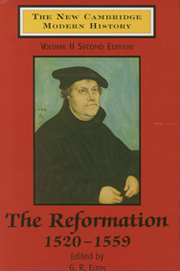Book contents
- Frontmatter
- Introduction to the second edition
- Chapter I The age of the Reformation
- Chapter II Economic change
- Chapter III The reformation movements in Germany
- Chapter IV The Reformation in Zurich, Strassburg and Geneva
- Chapter V The Anabaptists and the sects
- Chapter VI The Reformation in Scandinavia and the Baltic
- Chapter VII Politics and the institutionalisation of reform in Germany
- Chapter VIII Poland, Bohemia and Hungary
- Chapter IX The Reformation in France, 1515–1559
- Chapter X The Reformation in England
- Chapter XI Italy and the papacy
- Chapter XII The new orders
- Chapter XIII The empire of Charles V in Europe
- Chapter XIV The Habsburg–Valois wars
- Chapter XV Intellectual tendencies
- Chapter XVI Schools and universities
- Chapter XVII Constitutional development and political thought in western Europe
- Chapter XVIII Constitutional development and political thought in the Holy Roman Empire
- Chapter XIX Constitutional development and political thought in eastern Europe
- Chapter XX Armies, navies and the art of war
- Chapter XXI The Ottoman empire 1520–1566
- Chapter XXII Russia, 1462–1584
- Chapter XXIII The New World, 1521–1580
- Chapter XXIV Europe and the East
- Index
- References
Chapter XVI - Schools and universities
Published online by Cambridge University Press: 28 March 2008
- Frontmatter
- Introduction to the second edition
- Chapter I The age of the Reformation
- Chapter II Economic change
- Chapter III The reformation movements in Germany
- Chapter IV The Reformation in Zurich, Strassburg and Geneva
- Chapter V The Anabaptists and the sects
- Chapter VI The Reformation in Scandinavia and the Baltic
- Chapter VII Politics and the institutionalisation of reform in Germany
- Chapter VIII Poland, Bohemia and Hungary
- Chapter IX The Reformation in France, 1515–1559
- Chapter X The Reformation in England
- Chapter XI Italy and the papacy
- Chapter XII The new orders
- Chapter XIII The empire of Charles V in Europe
- Chapter XIV The Habsburg–Valois wars
- Chapter XV Intellectual tendencies
- Chapter XVI Schools and universities
- Chapter XVII Constitutional development and political thought in western Europe
- Chapter XVIII Constitutional development and political thought in the Holy Roman Empire
- Chapter XIX Constitutional development and political thought in eastern Europe
- Chapter XX Armies, navies and the art of war
- Chapter XXI The Ottoman empire 1520–1566
- Chapter XXII Russia, 1462–1584
- Chapter XXIII The New World, 1521–1580
- Chapter XXIV Europe and the East
- Index
- References
Summary
The rapid developments in educational theory and practice witnessed in this period have deservedly attracted much notice. There was a significant increase in the amount of speculation on the aims and methods of teaching and a number of institutions were established which actively practised new principles. Consideration of the question is, however, far from simple. On the one hand it is necessary to define the nature of the programme of educational reform in order to estimate, if possible, the degree to which schools and universities genuinely displayed a fresh approach. On the other hand one must disentangle the movement for reform in teaching from the movement for reform in religion, for the latter had marked repercussions in this field, not only confusing the issue for contemporaries but bedevilling later interpretations of the subject with confessional prejudice. Was there an advance in education or a regression? Did, or did not, the Reformation compromise and frustrate the Renaissance? Even the value of a classical education, which was adopted so firmly at this time as an ideal of pedagogy that it lasted invincible for over three centuries, has lately been called in question. On one point fortunately there can be little doubt. The novel attitudes which obtruded in the sixteenth century were not victorious suddenly. They modified existing machinery only gradually, and for much of the time over most of Europe the educational facilities of the mid sixteenth century were what they had been for some centuries before. It is therefore necessary to begin by surveying the traditional structure of schools and universities.
- Type
- Chapter
- Information
- The New Cambridge Modern History , pp. 452 - 477Publisher: Cambridge University PressPrint publication year: 1990



